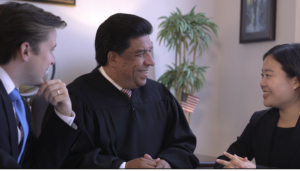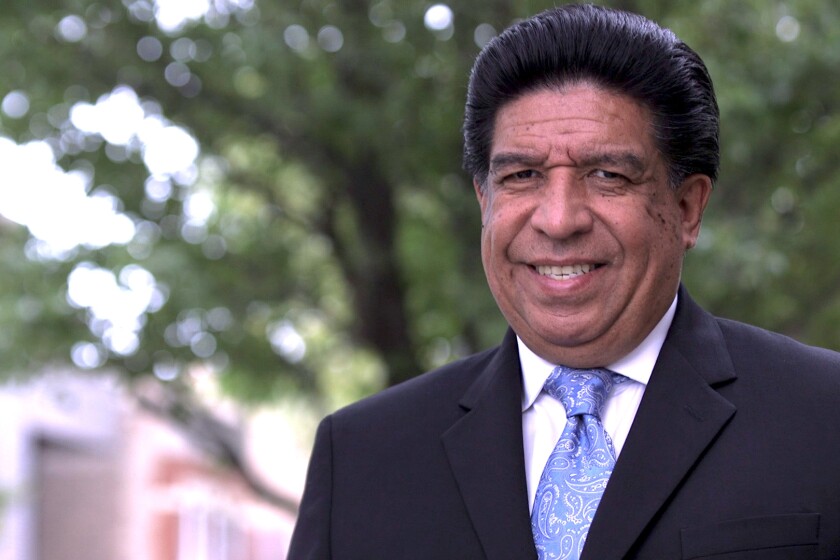Negocios Now Interviews Illinois Appellate Court Justice Jesse Reyes, Who Aims to Make History on Primary Election Day this March 19 as the First Latino Illinois Supreme Court Justice.
Negocios Now Staff
Raised in the Pilsen and Bridgeport neighborhoods of Chicago, Reyes decided to pursue a career in law after witnessing firsthand prevalent social justice issues in Latino and working-class communities.
In 2012, Judge Reyes made history as the first Latino elected to the Illinois Appellate Court.
During the interview with Negocios Now, Jesse delves into his motivations for seeking a seat on the highest court in the state, articulating his key strengths in the race against his opponent, Justice Joy Cunningham. Additionally, he outlines his plans for the potential future role within Illinois’ most significant judicial institution.
NN: Can you share the driving force behind your decision to run for a position on the Illinois Supreme Court again, especially considering your previous attempt? What motivates you to pursue this path once more?
I firmly believe I can make a difference by furthering access to justice for all. I have a record of providing access to justice throughout my judicial career. Listed below are just three examples of where I increased access to justice in our court system.
As an associate judge assigned to the traffic court, I created and produced an educational DVD for non-English speakers to better understand the consequences of driving under the influence and their rights in court. The program was designed for Spanish-speaking and Polish-speaking individuals who appeared in court.
As a Circuit Court Judge, when I was assigned to the Chancery Division’s Mortgage Foreclosure/Mechanics Lien Section at the height of the foreclosure, I established a program that tended to level the playing field between the attorneys representing the lenders and the pro-se litigants who would appear in court. On many occasions, this program would assist the homeowners in negotiating with the lenders to save their homes.
As an Appellate Court Justice, colleagues elected me to serve as Chair of our court’s Executive Committee. During my short term, we were able to reform some of our internal rules to create a more efficient and effective process for appeals to move through our court.
We also created a more efficient means of communicating with incarcerated non-English speaking individuals so that they would better understand what is occurring with their appeals.
Regarding the Pretrial Fairness Act (SAFE-T Act), once the Illinois Supreme Court found it constitutional, I convened several meetings with all of the stakeholders involved in implementing the hearings to be conducted and made some recommendations to the Illinois Supreme Court, which were accepted. Accordingly, the hearings in Cook County are proceeding more effectively than in the rest of the state.
Lastly, I am motivated to run for this office to lend a voice and perspective that the Illinois Supreme Court lacks. In the past five years, the court had three opportunities to appoint a Latino to the Court, but it did not do so. Considering Latinos make up nearly 29% of the population in Cook County, we as a community should have someone on the court to add what is needed: a voice.

Compared to your rivals, what key qualifications and strengths set you apart and position you as the most suitable candidate to succeed in this election?
As I previously mentioned, I bring an aggressive and prospective attitude regarding providing access to justice. As a jurist, having volunteered to serve wherever needed, I had the opportunity to preside over various criminal and civil matters. These varied assignments included Domestic Violence Court and the Chancery Division’s Mortgage Foreclosure/Mechanic Liens Section. I also bring a lived immigrant experience and a blue-collar perspective to the court. As former president and board member of the Illinois Judges Association, I also bring awareness of some issues that affect our state outside Cook County.
How do you perceive the current state of the Illinois Supreme Court, and do you believe there is room for improvement? If so, please outline your plan to enhance the Court’s effectiveness in delivering justice.
The current Illinois Supreme Court has implemented some programs to promote justice, but I firmly believe it could do a lot better. There are many areas, but I will limit my suggestive plans to three.
Implicit bias—We all have implicit biases, and the current Court should implement programs that address this issue. I would implement programs that educate judges and juries to avoid utilizing implicit biases when rendering decisions.
The court has some courses for judges regarding implicit bias, but the problems with implicit bias need to be addressed further. For example, rules need to be established that will have consequences if a judge is found to have used or relied on implicit bias when presiding over a matter or rendering a decision. We should also have independent third parties observe judges and report any signs of implicit bias.
Juries should be educated about implicit bias and how to avoid it when serving as a juror. The education should commence when the potential juror is sitting and waiting to be called to a courtroom. Once assigned to a courtroom, the trial judge should also inform the potential juror of the dangers of implicit bias and how to avoid utilizing implicit bias when listening to evidence, witnesses, etc. This education should also continue throughout the trial. Then, ending with a jury instruction admonishing jurors about using implicit bias when rendering a decision.
Addressing the issue of transparency, are there areas within the Court that need improvement regarding openness and clarity? If so, how would you approach enhancing transparency in the judicial process?
There is no current uniformity regarding how justices make appointments and how the public is informed of the vacancies. This system needs to be addressed and changed.
Proposed Change for the appointive process: The chief judges of each circuit court throughout the states must notify the Supreme Court of any vacancy that will occur. The Court must then notify the public that a vacancy will be filled. This notice needs to be provided to the public with enough time for interested individuals to apply. Further, all Supreme Court justices should have a committee comprising retired judges, lawyers, and community members. This committee should be provided with the credentials of the candidates seeking appointment and interview and vet the candidates. After that, recommendations will be made to the justice-seeking to make the appointment, who will then consider the committee’s recommendations. These recommendations should then be submitted to the other court members before making the appointment.
Another area where change is needed is in determining conflicts of interest. Currently, the justice determines whether there is a conflict of interest. As we have seen in the past, the question of a conflict has come up, and whether it is actual or perceived, this issue only serves to tarnish the court’s image.
Proposed Change: An independent body should be established to determine whether there is a conflict, whether actual or perceived; the independent body should be empowered to make the determination.
If elected, you would become the first Latino to hold a position in the highest judicial branch of Illinois. How do you envision including a Latino member contributing to the Court’s mission of delivering justice, and what positive impact could it have?
Having a Latino on the court with a lived immigrant experience and from a blue-collar neighborhood will add another dimension to the court, which currently does not exist. It will also promote confidence in those who come to the court to conduct their legal business and in the next generation looking for justice. In the words of Marian Wright Edelman, “You can’t be what you can’t see.”
As a final message to Illinois voters, what would you like them to know or consider when casting their votes in this election? How do you plan to represent and serve the interests of the diverse population within the state?
In voting for a judge, I believe the voters should consider my years of experience and qualifications and the intangibles, such as integrity, character, and honesty, which have never been questioned. The voters should also note that the Illinois State Bar Association and the Chicago Bar Association have found me to be “Highly Qualified” to serve on the Illinois Supreme Court. I have served as a judge for more years than my opponent, written extensively on a variety of legal topics, and have lectured internationally on constitutional issues. Most importantly, I am a public servant who believes in serving the public on and off the bench.
Throughout my legal career as a lawyer and a judge, I have worked with various communities to develop relationships that will allow for future diversity and inclusion in the legal profession. I have been honored by multiple bar associations and organizations for my efforts in promoting diversity in the legal profession.











